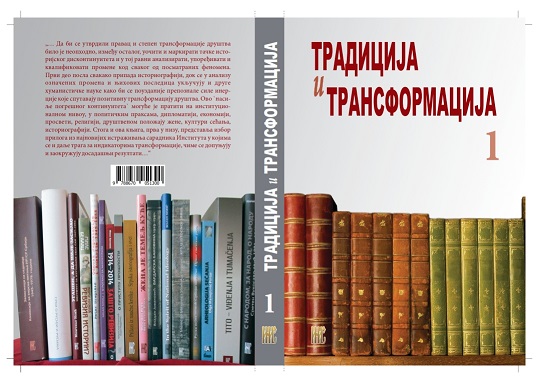Руска и српска традиција у новим околностима: СССР и Југославија 1918–1941.
Russian and Serbian Tradition under the New Circumstances: USSR and Yugoslavia from 1918 to 1941
Author(s): Aleksej J. Timofejev
Subject(s): Cultural history, Political history, International relations/trade, Sociology of Culture, Interwar Period (1920 - 1939), Sociology of Politics
Published by: Institut za noviju istoriju Srbije
Keywords: Serbian-Russian relations; World War I; World War II; Revolution 1917; Russian Emigration; Kominterna; Collaboration;
Summary/Abstract: After the February (March) events of 1917 in Russia; Serbian government was left without Russian support in negotiations with the Entente, regarding the future of Southeastern Europe. The provisional government neither wanted nor was able to have its own opinion on the future of the Balkans. The relations between the two countries have become even more tense after the outbreak of the Bolshevik (October) Revolution. The Bolshevik regime was jeopardizing diplomatic position of Serbia by declassifying and publishing top-secret diplomatic documents which included arrangements for future annexations and negotiations on a separate peace. After the Serbian diplomatic missions and military personnel were withdrawn to the Russian territory controlled by the Entente, some of the Serbian officers and soldiers became involved in the Civil War on both sides, although the offi cial Serbian att itude was, in spite of negative stance towards the Bolsheviks, “not to permit the use of Serbian army against the Russians.” During the interwar period there were two active social phenomena connected with former Russia - the political influence of the Comintern and the Russian emigration. Conservative circles gathered around Serbian King Aleksandar and Patriarch Varnava, who represented the most important patrons of Russian emigration in interwar Yugoslavia, were directly opposed to any relationship with the Bolsheviks. Yet in 1930s a new generation of Serbian politicians grew up which was culturally oriented towards France while politically it was inclined towards the United Kingdom; this generation of Yugoslav politicians was active in Soviet era and they had no recollections of imperial Russian era. On the other hand, the right-wing, anticommunist majority of Russian emigration, traditionally close to the Russian-German cultural ties, even though unable to understand the imperial nature of Nazism, was sympathetic to the Nazi Germany. In fact, it was a tragic discord between the Russian emigration in Yugoslavia and a signifi cant part of the Serbian people. The interwar activities of Comintern, KPJ and VKP (b) had an obvious anti-government impact, which accelerated the deterioration of Serbian-Russian relations. The infl uence of the Russian Revolution and the Soviet experience was quite obvious in the future actions of Yugoslav Bolsheviks. The Yugoslav political emigration in interwar Soviet Union was also aff ected by strong impressions of Stalinist repression. On the other hand, many Russian emigrants and exponents of Soviet policy took part in the Second World War in Yugoslavia, which strengthened the spirit of civil war and resistance. As the war ended, Russian society overcame the most of mental divisions caused by the civil war, while the situation in Yugoslavia and Serbia was quite the opposite. The liberation of eastern Yugoslav territories from the German armed forces, achieved by both partisan (cca. 40 thousand members of the National Liberation Army of Yugoslavia) and Soviet (300 thousand troops and Red Army) troops was followed by installation of a brutal one-party dictatorship of Soviet model. After the world wars era the ideological closeness between the most of Serbian and Russian people became more appreciable as the new period of ideological emanations from Russia was devoid of former ideological concepts. In this dramatic period, Serbs and Russians have established closer relations than ever before.
Book: Традиција и трансформација. Политичке и друштвене промене у Србији и Југославији у 20. веку
- Page Range: 79-101
- Page Count: 23
- Publication Year: 2015
- Language: Serbian
- Content File-PDF

